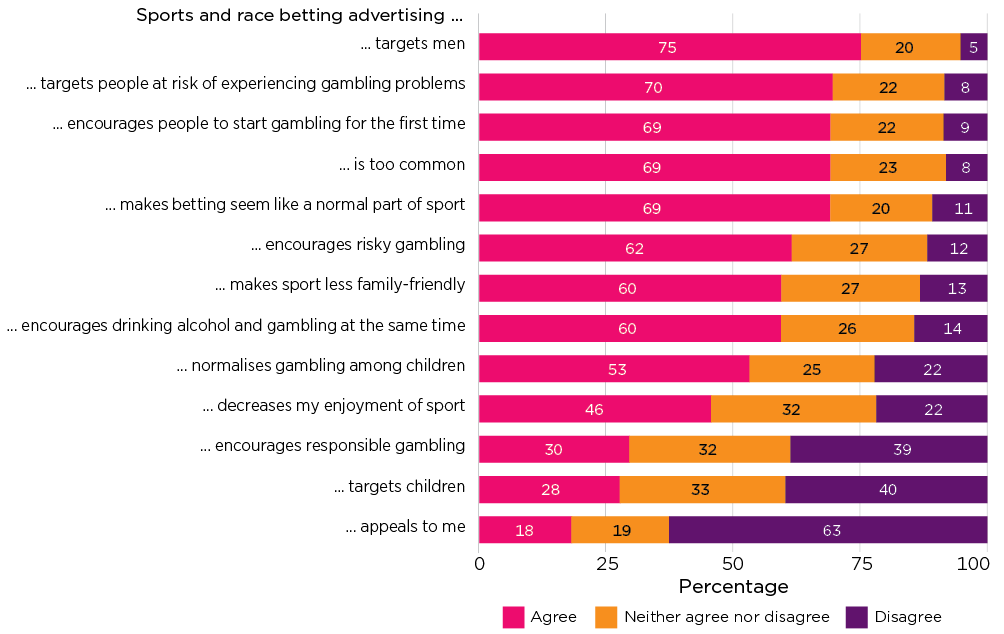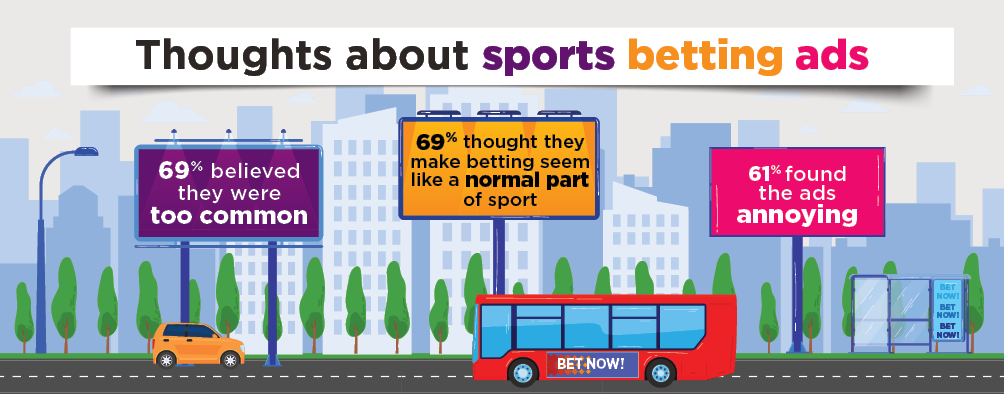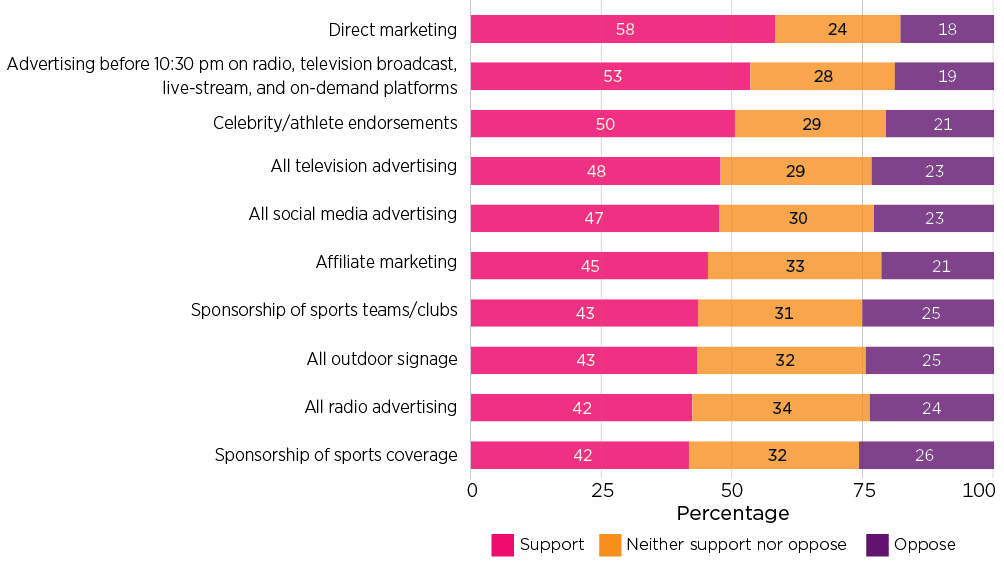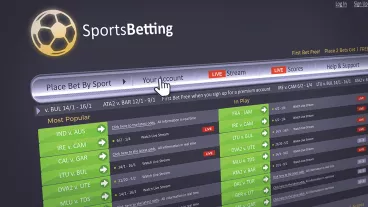Community attitudes towards sports and race betting advertising in Australia
March 2023
Rebecca Jenkinson, Cailem Murray Boyle, Kei Sakata, Nancy Greer, Uma Jatkar, Brian Vandenberg
Download Research snapshot
Key messages
-
Two-thirds (69%) of Australian adults believe that sports and race betting (wagering) advertising is 'too common'.
-
The majority agreed that wagering advertising 'makes betting seem like a normal part of sport' (69% agree), 'makes sport less family-friendly' (60% agree), 'normalises gambling among children' (53% agree) and 'decreases their enjoyment of sports' (46% agree).
-
Australians were concerned that wagering advertising targets 'people at risk of experiencing gambling problems' (70% agree) and that it encourages 'gambling for the first time' (69% agree), 'gambling more than usual' (70% agree) and 'engaging in risky gambling' (62% agree).
-
Few thought that it was appropriate for betting companies to have commercial relationships with 'players' (20% agree), 'sporting clubs/organisations' (27% agree) or 'media organisations' (22% agree).
-
Many support outright bans on wagering advertising across all platforms and types including:
- all wagering advertising broadcast before 10:30 pm on radio, TV, live-stream or on-demand (53% support; 19% oppose)
- all social media advertising (47% support; 23% oppose)
- through sponsorship of sports coverage (42% support; 26% oppose).
-
Australians believe that governments should play the biggest role in deciding how wagering is advertised (64%).
Attitudes towards wagering advertising
What do Australians think of sports and race betting advertising?
Two-thirds of Australian adults believed that sports and race betting advertising was 'too common' (69% agree; 8% disagree) (Figure 1), with half indicating they thought wagering advertising was 'more noticeable than other advertising' (51% agree; 17% disagree). While one in four found the ads 'entertaining' (27% agree; 49% disagree) and one in six felt the ads 'appealed to them' (18% agree; 63% disagree), a majority of Australian adults found them 'annoying' (61% agree; 16% disagree).
Figure 1: Australians' views on sports and race betting advertising

Notes: Australian adults (whole sample; n = 1,765). Australian Bureau of Statistics (ABS) weights (age/gender) used for estimation. Percentages may not total to 100.0% due to rounding.

What impact does this advertising have on sports?
Most Australian adults believed that sports and race betting advertising 'makes betting seem like a normal part of sport' (69% agree; 11% disagree) and 'makes sport less family-friendly' (60% agree; 13% disagree). Almost half of those surveyed said that seeing or hearing these ads 'decreases their enjoyment of sports' (46% agree; 22% disagree).
Who do these ads target?
Most believed that sports and race betting advertising 'targets men' (75% agree; 5% disagree); one in four felt it 'targets women' (28% agree; 33% disagree). A majority also believed that wagering ads targeted 'people at risk of experiencing gambling problems' (70% agree, 8% disagree), and this view was shared by those who were, themselves, at risk of gambling harm (61% agree; 12% disagree). More than half of those surveyed felt that sports and race betting advertising 'normalises gambling among children' (53% agree; 22% disagree), and one in four believed that the advertising 'targets children directly' (28% agree; 40% disagree).
What behaviours do these ads encourage?
The survey responses show concern about the impacts of advertising. Most Australians felt that sports and race betting advertising encouraged 'gambling for the first time' (69% agree; 9% disagree), 'gambling more than usual' (70% agree; 8% disagree), engaging in 'risky gambling' (62% agree; 12% disagree) and 'drinking alcohol and gambling at the same time' (60% agree; 14% disagree). A large proportion also believed that wagering ads encouraged 'betting with friends' (71% agree; 8% disagree) and 'pressuring others to bet' (58% agree; 17% disagree). Opinion was mixed on whether these ads encouraged 'responsible gambling' (30% agree; 39% disagree).
What do people think about commercial relationships with betting companies?
Only a quarter of Australian adults believed that it was appropriate for betting companies to have commercial relationships with 'sporting clubs/organisations' (27% agree; 43% disagree) or 'media organisations' (22% agree; 44% disagree). Concern was strongest in relation to 'players' having commercial relationships with betting companies (20% agree it is appropriate; 52% disagree).
Views on rules and regulation of wagering advertising
How do Australians feel about stronger controls on sports and race betting advertising?
The majority believe that the way sports and race betting is advertised is getting 'worse' (54%), a quarter believe it is staying around the 'same' (25%), and a few believe it is getting 'better' (6%).
The survey showed that many Australian adults support outright bans on all forms of sports and race betting advertising, though support varied slightly between the type and platform/location of advertising (Figure 2). The greatest support was for an outright ban on 'direct marketing' (58% support; 18% oppose). Two in five participants also supported outright bans on 'sponsorship of sporting teams/clubs' (43% support; 25% oppose) and 'sponsorship of sports coverage' (42% support; 26% oppose).
Figure 2: Australians' support for outright bans on wagering advertising types and platforms

Notes: Australian adults (whole sample; n = 1,765). ABS weights used for estimation.
Australians were more than twice as likely to support an outright ban, rather than oppose one, on all sports and race betting advertising on 'television' (48% support; 23% oppose). There was also high support for outright bans on other advertising platforms, such as 'social media' (47% support; 23% oppose), 'radio' (42% support; 24%) and 'outdoor signage' (43% support; 25% oppose).
Around half of Australian adults support an outright ban on 'all advertising before 10:30 pm on television, radio, live-stream and on-demand platforms' (53% support; 19% oppose).
Support for outright bans on wagering advertising was reasonably consistent across age and gender. Older Australians tended to be more supportive of proposed bans on advertising across all platforms. Among younger age groups, women aged 18-34 were more supportive than men aged 18-34 of outright bans on wagering advertising before 10:30 pm, and women aged 35-54 were more supportive than men their age of bans on direct marketing (Figure 3).
Figure 3: Proportion of Australians who support or oppose an outright ban on all sports and race betting advertising: (a) before 10:30 pm on radio, television, live-stream and on-demand platforms, (b) via direct marketing (e.g. text message, email).

Notes: 18-34 (Male: n = 268; Female: n = 272); 35-54 (Male: n = 296; Female: n = 296); 55+ (Male: n = 301; Female: n = 319). Participants whose response to gender identity was 'non-binary' or 'prefer not to say' were not included in the gender analysis due to small sample size. Responses for 'Neither support nor oppose' are not shown. Australian Bureau of Statistics (ABS) weights (age/gender) used for estimation. *p < 0.05, **p < 0.01.
Who is responsible for the way sports and race betting is advertised in Australia?
The survey showed that most adult Australians (64%) believed that 'governments' should play the biggest role in deciding how sports and race betting is advertised in Australia. A smaller proportion believed that 'gambling companies' (23%), 'sporting or racing clubs/teams' (18%) and 'gambling venues/licensees' (18%) should play a role.

Our survey
An online general community panel survey was conducted in July 2022. A sample of 1,765 Australian residents aged 18 years and over, aligned with ABS population parameters of age, gender and location of residence (metro and non-metro), completed the survey. We explored participants' views on sports and race betting advertising by asking how much they agreed with a range of statements on a scale from 'strongly disagree' to 'strongly agree', and whether they 'supported' or 'opposed' a range of potential policy responses. As part of the survey, we also asked participants about their gambling participation in the past 12 months, including what products they gambled on, how much they spent, what platforms/modes they used to gamble, and how gambling impacted their health and wellbeing. We partnered with ORIMA Research and the Online Research Unit (ORU) to collect the survey data.
See all survey snapshots
- Gambling participation, experience of harm and community views
- Gambling participation and experience of harm in Australia
- Exposure and impact of sports and race betting advertising in Australia
News stories
- Cut-off time: Support for banning gambling ads before 10.30pm| The Age
- Two thirds of Australians believe gambling ads are 'too common'| ABC News
- New Report Reveals Harmful Impact Of Gambling Ads| 10 News First Twitter
- Fresh Measures To Reduce Gambling Harm In Aussie Families| 10 News First Twitter
- Majority of Australians support banning gambling advertising on TV, study finds| The Guardian
- Young Australians being exposed to tsunami of powerful gambling ads, study reveals| 9News
- Support for ban on gambling ads| ABC News
- Most Australians support banning gambling ads: research| ABC News
- 'Destroying lives': Calls for action as survey finds two in five Australian adults gamble weekly| SBS News
- 'Money off misery': Crossbenchers demand Labor crack down on gambling ads, political donations| SBS News
- New research finds three-quarters of Australian adults have gambled at least once over the past 12 months| The West Australian
Contributions and acknowledgements
This research was conducted by the Australian Gambling Research Centre (AGRC) team at the Australian Institute of Family Studies: Dr Rebecca Jenkinson, Cailem Murray Boyle, Dr Kei Sakata, Nancy Greer, Uma Jatkar, and Dr Brian Vandenberg.
Featured images: © GettyImages/skynesher
Suggested citation
Australian Gambling Research Centre. (2023). Community attitudes towards sports and race betting advertising in Australia. Melbourne: Australian Gambling Research Centre, Australian Institute of Family Studies.
Download Research snapshot
Related publications

Gambling participation, experience of harm and community…
AGRC recently asked Australian adults about their participation in gambling, attitudes towards wagering advertising,…
Read more
Gambling participation and experience of harm in Australia
This snapshot explores how often Australians gamble, how much they spent, their risk of gambling harm, what products…
Read more
Exposure and impact of sports and race betting advertising…
This snapshot shows where and how often Australians are exposed to wagering advertising. It then explores the…
Read more